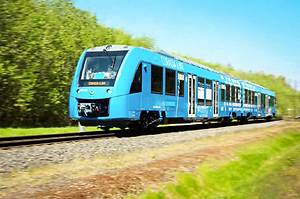Hydrogen-powered drives of the rail vehicles (part 1)
1
Łukasiewicz-IPS”TABOR”
Online publication date: 2021-07-05
Publication date: 2021-07-05
Rail Vehicles/Pojazdy Szynowe 2021,2,29-40
KEYWORDS
ABSTRACT
The paper presents the reasons for launching the efforts aimed at implementing the lowemission
rail vehicles. A short history of development of the hydrogen-powered drive solutions
is described. It has been pointed out that implementation of hydrogen-powered rail vehicles results
in simultaneous development of production and distribution of this fuel. The qualities of
new energy sources suitable for use in the rail vehicles are depicted, while further part of the
paper presents the rail vehicles already implemented in the world. Another part of the article
pertains to domestically undertaken measures related to hydrogen propulsion. Due to topicality
of the National Reconstruction Plan, the excerpts from its provisions related to hydrogen production
and modern rail transport have been mentioned. The following chapter is devoted to
economic aspects, while the last one to measurable environmental benefits resulting from the
use of the hydrogen traction. Another part of the paper will be published in the next issue of the
Rail Vehicles.
REFERENCES (27)
3.
D’Ovidio G., Carpenito A., Masciovecchio C., Ometto A.: Preliminary analysis on advanced technologies for hydrogen light-rail train application in sub-urban non electrified routes. National Scientific Seminar SIDT. Politecnico Di Bari. 14-15.09.2017. University of L’Aquila ITALY
5.
Durzyński Z., Orczyk M.: Tram-train elementem proekologicznego systemu transportu zbiorowego w aglomeracji poznańskiej. Pojazdy Szynowe nr 4/2019. https://doi.org/10.53502/RAIL-...
6.
Durzyński Z.: Stan obecny i perspektywy niezelektryfikowanego transportu kolejowego w Polsce. Pojazdy Szynowe nr 4/2020. https://doi.org/10.53502/RAIL-...
7.
Dyrektywa Parlamentu Europejskiego i Rady z dnia 22 października 2014 r. w sprawie rozwoju infrastruktury paliw alternatywnych - 2014/94/UE
14.
Hydrogen-powered trains could replace diesel engines in Germany. https://edition.cnn.com/2020/1...
16.
Krajowy Plan Odbudowy i Zwiększania Odporności. Projekt. Ministerstwo Funduszy i Polityki Regionalnej. Warszawa, kwiecień 2021 r.
17.
Orczyk M. i inni: Circumstances of Railway Transport Hydrogenization in Poland. SAE Technical Paper 2020-01-2131, 2020, https://doi.org/10.4271/2020-0...
18.
Pielecha i i inni: Ultrakondensatory i ogniwa paliwowe w układach napędowych pojazdów szynowych. Pojazdy Szynowe nr 2/2019. https://doi.org/10.53502/RAIL-...
19.
Radomski M.: Pociągi wodorowe na polskich torach? To możliwe już w 2022 roku, ale do rozwiązania jest kilka problemów. Fleetguru. 12.09.2018
20.
Spain’s first hydrogen train to feature Hexagon Purus technology. https://www.h2-view.com/story/...
21.
Strategia na rzecz odpowiedzialnego rozwoju do roku 2020 (z perspektywą do 2030 r.). Warszawa 2017
22.
Uchwała nr 110/2019 Rady Ministrów z dnia 17 września 2019 r. zmieniająca Uchwałę w sprawie ustanowienia Krajowego Programu Kolejowego do 2023 roku
24.
Wodór – samorządy potrzebują systemowego wsparcia finansowego i nowego modelu współpracy. https://www.rynekinfrastruktur...
26.
Wodór, prąd, biopaliwa. Dekarbonizacja transportu będzie kosztowna. https://wysokienapiecie.pl/195...
CITATIONS (11):
1.
Use of hydrogen fuel in drive systems of rail vehicles
Ireneusz Pielecha, Danilo Engelmann, Jan Czerwinski, Jerzy Merkisz
Rail Vehicles/Pojazdy Szynowe
Ireneusz Pielecha, Danilo Engelmann, Jan Czerwinski, Jerzy Merkisz
Rail Vehicles/Pojazdy Szynowe
2.
Energy flow analysis based on a simulated drive of a hybrid locomotive powered by fuel cells
Ireneusz Pielecha, Radostin Dimitrov, Veselin Mihaylov
Rail Vehicles/Pojazdy Szynowe
Ireneusz Pielecha, Radostin Dimitrov, Veselin Mihaylov
Rail Vehicles/Pojazdy Szynowe
3.
Simulation Analysis of an Electric Multiple Unit Vehicle Energy Consumption
Karol Bryk, Patryk Urbański, Dawid Gallas, Piotr Tarnawski, Piotr Michalak, Paweł Stobnicki
SAE Technical Paper Series
Karol Bryk, Patryk Urbański, Dawid Gallas, Piotr Tarnawski, Piotr Michalak, Paweł Stobnicki
SAE Technical Paper Series
4.
Analysis of the selection of the auxiliary drive system for a special purpose hybrid rail vehicle
Patryk Urbański, Dawid Gallas, Arkadiusz Stachowicz, Wojciech Jakuszko, Paweł Stobnicki
Rail Vehicles/Pojazdy Szynowe
Patryk Urbański, Dawid Gallas, Arkadiusz Stachowicz, Wojciech Jakuszko, Paweł Stobnicki
Rail Vehicles/Pojazdy Szynowe
5.
Application of alternative drive systems in modern special-purpose rail vehicles
Dawid Gallas, Paweł Stobnicki, Wojciech Jakuszko, Patryk Urbański, Justyna Kikut
WUT Journal of Transportation Engineering
Dawid Gallas, Paweł Stobnicki, Wojciech Jakuszko, Patryk Urbański, Justyna Kikut
WUT Journal of Transportation Engineering
6.
Model of energy consumption by brake discs of rail vehicles
Wojciech Sawczuk, Mateusz Jüngst, Daniel Kaczmarek
Rail Vehicles/Pojazdy Szynowe
Wojciech Sawczuk, Mateusz Jüngst, Daniel Kaczmarek
Rail Vehicles/Pojazdy Szynowe
7.
Hydrogen as an alternative energy source in railway vehicles
Piotr Kowalski, Krzysztof Kołodziejczak, Eryk Frąckowiak
Rail Vehicles/Pojazdy Szynowe
Piotr Kowalski, Krzysztof Kołodziejczak, Eryk Frąckowiak
Rail Vehicles/Pojazdy Szynowe
8.
Characteristics of fuel cells under static and dynamic conditions
Filip Szwajca, Andrew Berger, Robert Spalletta, Ireneusz Pielecha
Rail Vehicles/Pojazdy Szynowe
Filip Szwajca, Andrew Berger, Robert Spalletta, Ireneusz Pielecha
Rail Vehicles/Pojazdy Szynowe
9.
Modular hydrogen fuel cell propulsion test stand for railway applications
Patryk Radziszewski, Patryk Urbański, Łukasz Rozynek, Piotr Ciepły, Mikołaj Barański, Maksymilian Cierniewski
Combustion Engines
Patryk Radziszewski, Patryk Urbański, Łukasz Rozynek, Piotr Ciepły, Mikołaj Barański, Maksymilian Cierniewski
Combustion Engines
10.
A Numerical Study of the Effect of Hydrogen Fuelled Turbulent Jet Ignition Engine
Ireneusz Pielecha, Jerzy Merkisz, Patryk Urbański, Dawid Gallas, Monika Andrych-Zalewska
SAE Technical Paper Series
Ireneusz Pielecha, Jerzy Merkisz, Patryk Urbański, Dawid Gallas, Monika Andrych-Zalewska
SAE Technical Paper Series
11.
Share
RELATED ARTICLE
We process personal data collected when visiting the website. The function of obtaining information about users and their behavior is carried out by voluntarily entered information in forms and saving cookies in end devices. Data, including cookies, are used to provide services, improve the user experience and to analyze the traffic in accordance with the Privacy policy. Data are also collected and processed by Google Analytics tool (more).
You can change cookies settings in your browser. Restricted use of cookies in the browser configuration may affect some functionalities of the website.
You can change cookies settings in your browser. Restricted use of cookies in the browser configuration may affect some functionalities of the website.



